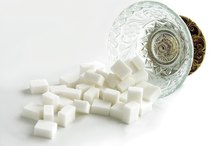Diet for Liver Regeneration
The primary functions of the liver are to detoxify the body and to produce the bile used to digest food. However, the liver also stores certain vitamins, minerals, sugars, regulates fat storage and controls the production and excretion of cholesterol. By neutralizing poisonous substances, metabolizing alcohol and removing bacteria from the blood, the liver plays an important role in keeping the body healthy. If the liver has been damaged, a healthy, well-balanced diet may help the liver cells regenerate.
If you are experiencing serious medical symptoms, seek emergency treatment immediately.
Vitamins
Since the liver filters the unused nutrients out of the body, an excessive amount of certain vitamins can cause additional stress on the liver. Mega-vitamin supplements, especially ones containing large amounts of vitamin A and vitamin D, can be particularly toxic. However, it may be beneficial to supplement a diet designed for liver health with additional vitamin B complexes.
Calories and Carbohydrates
Diet for Liver Hemangioma
Learn More
Carbohydrates should be the major source of calories in a diet designed for liver health 2. Increased consumption of carbohydrates and fats may prevent protein from breaking down, preserving it in the body. However, it is important to monitor caloric intake. Excessive calories, especially in the form of carbohydrates, can cause fat deposits to form in the liver, causing further stress to the liver. On average, a person needs about 15 calories a day per pound of weight in order to meet his daily caloric needs.
- Carbohydrates should be the major source of calories in a diet designed for liver health 2.
- Excessive calories, especially in the form of carbohydrates, can cause fat deposits to form in the liver, causing further stress to the liver.
Sodium
Liver disease can cause fluid retention in the body, especially around the abdomen or hands and feet. Since sodium can increase the amount of fluid in the body, reducing the amount of sodium in a diet can help decrease the levels of excess fluid. While most foods contain small amounts of sodium, table salt and processed foods tend to contain large amounts. Foods that contain more then 300 mg of sodium per serving are considered high in sodium and should be avoided.
- Liver disease can cause fluid retention in the body, especially around the abdomen or hands and feet.
- Foods that contain more then 300 mg of sodium per serving are considered high in sodium and should be avoided.
Protein
Foods Known to Damage the Liver
Learn More
The liver plays an important role in the digestion of protein. As protein is being broken down, waste products such as ammonia are formed. A healthy liver can rid the body of these toxins, however, if the liver has been compromised, toxins can build up in the blood and tissue. This build-up of toxins can cause tiredness, nausea, vomiting, forgetfulness and mental confusion. To avoid this, a diet for liver regeneration may contain only about 1 g of protein per kg of body weight.
- The liver plays an important role in the digestion of protein.
- A healthy liver can rid the body of these toxins, however, if the liver has been compromised, toxins can build up in the blood and tissue.
Alcohol and Drugs
In order to give the liver a chance to regenerate, avoid substances that can stress the liver. Since alcohol is filtered out of the body through the liver, all forms of alcohol should be avoided until the liver has a chance to rebuild. Also avoid medicines containing acetaminophen, since, like alcohol, acetaminophen is filtered through the liver. Certain herbal remedies like comfrey, margosa oil, mate tea and chaparral can also be toxic to a liver, especially if liver cells have already been damaged.
- In order to give the liver a chance to regenerate, avoid substances that can stress the liver.
- Certain herbal remedies like comfrey, margosa oil, mate tea and chaparral can also be toxic to a liver, especially if liver cells have already been damaged.
Related Articles
References
- Herpatitis Foundation International: Caring for Your Liver
- National Institutes of Health: Diet and Liver Disease
- Cleveland Clinic. Cirrhosis of the Liver. Reviewed January 11, 2019.
- David S, Hamilton JP. Drug-induced Liver Injury. US Gastroenterol Hepatol Rev. 2010;6:73–80.
- American Liver Foundation. Medications.
- Cleveland Clinic Health Essentials. Is Acetaminophen Safe to Take When You're Drinking? Published December 19, 2017.
- University of Michigan, Michigan Medicine. Methyldopa. Revised September 17, 2018.
- Elsevier Science Direct. Hypervitaminosis A. Published 2015.
- National Center for Biotechnology Information, U.S. National Library of Medicine. LiverTox: Clinical and Research Information on Drug-Induced Liver Injury: Vitamin A. Updated December 3, 2013.
- National Center for Biotechnology Information, U.S. National Library of Medicine. LiverTox: Clinical and Research Information on Drug-Induced Liver Injury: Niacin. Updated February 2, 2014.
- Amathieu R, Levesque E, Merle JC, et al. Insuffisances hépatiques aiguës sévères d'origine toxique : prise en charge étiologique et symptomatique [Severe toxic acute liver failure: etiology and treatment]. Ann Fr Anesth Reanim. 2013;32(6):416–421. doi:10.1016/j.annfar.2013.03.004
- Devarbhavi H. An Update on Drug-induced Liver Injury. J Clin Exp Hepatol. 2012;2(3):247–259. doi:10.1016/j.jceh.2012.05.002
- Johns Hopkins Medicine. Drug-Induced Hepatitis.









